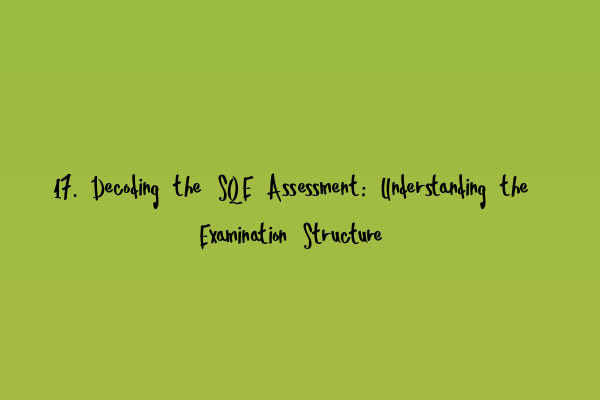Decoding the SQE Assessment: Understanding the Examination Structure
Aspiring solicitors, listen up! The Solicitors Qualifying Examination (SQE) is the new assessment that will determine your readiness to practice law in England and Wales. This comprehensive exam is designed to evaluate your knowledge and skills in various areas of law, ensuring you are well-equipped to serve your clients effectively. In this blog post, we will decode the SQE assessment and break down its examination structure, so you can better understand what to expect and how to prepare.
1. Introduction to the SQE Assessment
The SQE replaces the previous qualification route, which comprised the Legal Practice Course (LPC) and the Professional Skills Course (PSC). The new assessment is divided into two stages: SQE1 and SQE2. Let’s delve into each stage in detail.
1.1 SQE1: Testing Foundation Knowledge
SQE1 is a multiple-choice exam that evaluates your foundation knowledge across various legal practice areas. This stage of the assessment consists of two parts:
- Part 1: Functioning Legal Knowledge – This section tests your understanding of how the law works, its principles, and legal obligations.
- Part 2: Practical Legal Skills – Here, you will be assessed on your ability to apply legal knowledge to real-life situations and solve hypothetical problems.
Remember, the SQE is not solely about memorizing legal rules. It aims to assess your ability to think critically, analyze scenarios, and reason logically.
1.2 SQE2: Assessing Practical Legal Skills
SQE2 focuses on assessing your practical legal skills, merging both oral and written assessments. This stage consists of the following:
- Client Interviewing and Attendance Note – You will be tested on your ability to engage with a client effectively, gather relevant information, and document it in an attendance note.
- Advocacy and Case Analysis – This assessment evaluates your courtroom advocacy skills and your capability to analyze legal cases.
- Legal Research – In this section, you will be tasked with researching complex legal matters and providing concise and accurate research outcomes.
- Legal Writing – You will be assessed on your ability to draft legal documents, such as memos, letters, and contracts.
It is essential to note that SQE2 focuses on assessing your practical skills and your ability to apply legal principles to real-life scenarios. It is crucial to familiarize yourself with these practical legal tasks and practice them extensively to excel in this stage of the SQE.
2. Preparing for the SQE Assessment
Now that you understand the examination structure, it’s time to prepare effectively for the SQE. Here are some tips to help you get started:
2.1 Study Smart
The SQE assessment requires extensive knowledge and critical thinking skills. Study strategically by creating a study plan that covers all the essential topics and allocates time for revision and practice.
2.2 Practice, Practice, Practice
Repetition is key when it comes to preparing for the SQE. Solve practice questions, engage in mock exams, and simulate real-life scenarios to enhance your skills and boost your confidence.
2.3 Seek Professional Guidance
Consider seeking guidance from professional SQE tutors who can provide expert insights, personalized feedback, and valuable tips to help you excel in the examination. Their experience and expertise can make a significant difference in your preparation.
2.4 Stay Updated with Legal Developments
The legal profession is constantly evolving, and it is crucial to stay updated with the latest legal developments. Stay abreast of new case law, legislative changes, and emerging trends to demonstrate your awareness and adaptability.
2.5 Take Care of Yourself
Preparing for the SQE is undoubtedly demanding, but don’t forget to prioritize self-care. Take breaks, get enough sleep, maintain a healthy lifestyle, and engage in activities that help you relax and rejuvenate. A well-rested mind is better equipped to absorb and retain information.
Conclusion
Decoding the SQE assessment and understanding its examination structure is essential for your preparation. By studying smart, practicing extensively, seeking professional guidance, staying updated with legal developments, and prioritizing self-care, you can position yourself for success in this comprehensive examination. Remember, the SQE is not merely a test of knowledge; it is an opportunity to showcase your skills, critical thinking, and ability to apply the law in practice. Good luck!

Leave a Reply